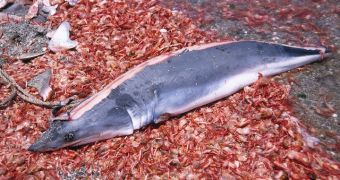Indeed, sharks possess amazing traits. They are believed not to develop cancer. As they lack blood vessels in cartilage, preclinical studies were made on them supporting the idea that they may contain inhibitors of angiogenesis (blood vessel formation), as cancer cells feed themselves by angiogenesis.
But the first scientific trial assessing the effects of the shark cartilage extract, AE-941 or Neovastat, made by a team at The University of Texas M. D. Anderson Cancer Center, has revealed no benefit as a therapeutic agent when mixed with chemotherapy and radiation for those suffering with advanced non-small cell lung cancer.
"Early Phase I and II studies in lung and renal cancers suggested some benefit to patients when AE-941 was given at higher doses," said lead researcher Dr. Charles Lu, associate professor in M. D. Anderson's Department of Thoracic/Head and Neck Medical Oncology.
"This is the first large Phase III randomized trial of shark cartilage as a cancer agent. A unique and important aspect about this shark cartilage study was that this product, Neovastat, was never sold over-the-counter, unlike other shark cartilage compounds previously studied. The company, Aeterna Zentaris, developed the compound as a pharmaceutical as opposed to a compound sold for profit that is available over the Internet, for example," said Lu.
The Phase III trial enrolled 384 newly-diagnosed untreated Stage III non-small cell lung cancer patients at 53 locations in the US and in Canada from June 2000 to February 2006. All volunteers received the standard chemotherapy and chemo-radiation therapy. They received either shark cartilage extract or placebo. The subjects took four ounces (120 g) of the extract twice daily and followed the shark cartilage/placebo as maintenance after finishing standard therapy.
A follow-up of 3.7 years did find no statistical difference in survival rate between those who received the shark cartilage extract and those who received the placebo.
"Clearly, these results demonstrate that AE-941 is not an effective therapeutic agent for lung cancer. So, too, these findings have to cast major skepticism on shark cartilage products that are being sold for profit and have no data to support their efficacy as cancer-fighting agent. Patients who are currently taking shark cartilage should be very cautious in accepting that the therapy will be beneficial", warns Lu.
Lung cancer is the greatest cancer killer in both genders; over 213,380 patients are found annually in US and over 160,390 die of it. Non-small cell type accounts for 80 % of all lung cancers.

 14 DAY TRIAL //
14 DAY TRIAL //